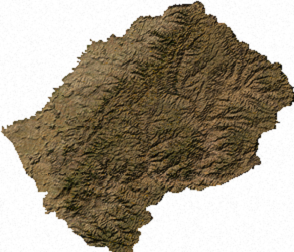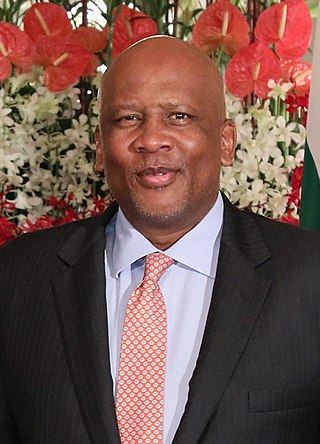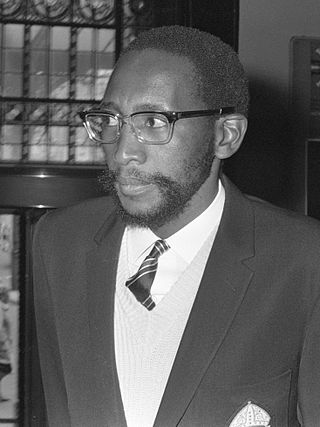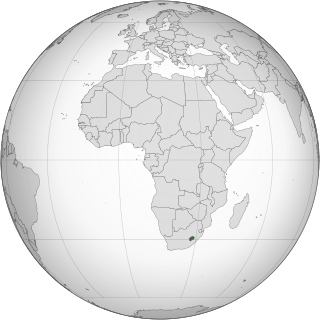
Lesotho, formally the Kingdom of Lesotho, formerly known as Basutoland, is a landlocked country in Southern Africa. As an enclave of South Africa, with which it shares a 1,106 km (687 mi) border, it is the largest sovereign enclave in the world, and the only one outside of the Italian Peninsula. It is situated in the Maloti Mountains and contains the highest peak in Southern Africa. It has an area of over 30,000 km2 (11,600 sq mi) and has a population of about two million. Its capital and largest city is Maseru. The country is also known by the nickname The Mountain Kingdom/The Kingdom in the Sky.

Lesotho is a mountainous, landlocked country located in Southern Africa. It is an enclave, surrounded by South Africa. The total length of the country's borders is 909 kilometres (565 mi). Lesotho covers an area of around 30,355 square kilometres (11,720 sq mi), of which a negligible percentage is covered with water.

The economy of Lesotho is based on tourism, manufacturing, mining, and agriculture, and depends heavily on remittances from its diaspora. Lesotho, a lower middle income country, is geographically surrounded by South Africa and is economically integrated with it as well. A significant portion of the population subsists on farming with a gradual ongoing transition into tourism and manufacturing.
Telecommunications in Lesotho include radio, television, print and online newspapers, fixed and mobile telephones, and the Internet.

Letsie III is King of Lesotho. He succeeded his father, Bereng Seeiso Moshoeshoe II, who was forced into exile in 1990. His father was briefly restored in 1995 but died in a car crash in early 1996, and Letsie became king again. As a constitutional monarch, most of King Letsie's duties as monarch of Lesotho are ceremonial. In 2000, he declared HIV/AIDS in Lesotho to be a natural disaster, prompting immediate national and international response to the epidemic.

Moshoeshoe II, previously known as Constantine Bereng Seeiso, was the Paramount Chief of Basutoland, succeeding paramount chief Seeiso from 1960 until the country gained full independence from Britain in 1966. He was King of Lesotho from 1966 until his exile in 1990, and from 1995 until his death in 1996.

The Sotho, also known as the Basotho, are a Sotho-Tswana ethnic group who have long inhabited Southern Africa. They primarily inhabit the regions of Lesotho, South Africa, Botswana and Namibia

The National University of Lesotho, the main and oldest university in Lesotho, is located in Roma, 34 km (21 mi) southeast of Maseru, the capital of Lesotho. The Roma valley is broad and is surrounded by a barrier of rugged mountains which provides magnificent scenery. The university enjoys a temperate climate with four distinct seasons. The governing body of the university is the council and academic policy is in the hands of Senate, both Council and Senate being established by the Act.
The Lesotho national football team, also known as LNFT, represents Lesotho in men's international association football and is governed by the Lesotho Football Association.

The Lesotho Highlands Water Project (LHWP) is an ongoing water supply project with a hydropower component, developed in partnership between the governments of Lesotho and South Africa. It comprises a system of several large dams and tunnels throughout Lesotho and delivers water to the Vaal River System in South Africa. In Lesotho, it involves the rivers Malibamatso, Matsoku, Senqunyane, and Senqu. It is the Africa's largest water transfer scheme.

Lesotho first participated at the Olympic Games in 1972 and has sent athletes to compete in every Summer Olympic Games since then, except when they boycotted the 1976 Summer Olympics along with most other African nations. Lesotho has never participated in the Winter Olympic Games.

Lesbian, gay, bisexual, transgender, and queer (LGBTQ) people in Lesotho face legal challenges not experienced by non-LGBTQ residents. Lesotho does not recognise same-sex marriages or civil unions. Discrimination on the basis of sexual orientation and gender identity in employment is banned since 2024.

Lesotho–Russia relations are the bilateral relations between Russia and Lesotho.

The Lesotho women's national football team, also known affectionately as Mehalalitoe, represents Lesotho in international women's football. Governed by the Lesotho Football Association (LFA), the team has demonstrated steady progress in recent years, particularly within the regional Council of Southern Africa Football Associations (COSAFA) competitions.

Lesotho competed at the 2012 Summer Olympics in London, which was held from 27 July to 12 August 2012. The country's participation at London marked its tenth appearance in the Summer Olympics since its début at the 1972 Summer Olympics. The delegation included three track and field athletes; Tsepo Ramonene, Mosito Lehata and Mamorallo Tjoka, and one swimmer; Masempe Theko. Ramonene and Lehata qualified for the Games by meeting qualification standards, while Tjoka and Theko made the Olympics through wildcard places. Tjoka was selected as the flag bearer for the opening ceremony while Lehata held it at the closing ceremony. Ramonene finished last in the men's marathon and was revived by medical personnel during the event. Lehata did not progress to the semi-finals of the men's 200 metres and Tjoka finished in 90th in the women's marathon. Theko finished 73rd overall in the women's 50 metre freestyle and did not progress to the semi-finals of the event.

Human rights in Lesotho, a nation of 2,067,000 people completely surrounded by South Africa, is a contentious issue. In its 2012 Freedom in the World report, Freedom House declared the country "Partly Free". According to the United States Bureau of Democracy, Human Rights and Labor, which produces annual human rights reports on the country, the most pressing human rights issues are the use of torture, poor prison conditions, and the abuse of women and children.
The Commander of the Lesotho Defence Force is the professional head of the Defence Force. He is responsible for the administration and the operational control of the Lesotho military.

Basotho nationality law is regulated by the Constitution of Lesotho, as amended; the Lesotho Citizenship Order, and its revisions; the 1983 Refugees Act; and various international agreements to which the country is a signatory. These laws determine who is, or is eligible to be, a national of Lesotho. The legal means to acquire nationality, formal legal membership in a nation, differ from the domestic relationship of rights and obligations between a national and the nation, known as citizenship. Nationality describes the relationship of an individual to the state under international law, whereas citizenship is the domestic relationship of an individual within the nation. In Britain and thus the Commonwealth of Nations, though the terms are often used synonymously outside of law, they are governed by different statutes and regulated by different authorities. Basotho nationality is typically obtained under the principle of jus soli, born in Lesotho, or jus sanguinis, i.e. by birth in Lesotho or abroad to parents with Basotho nationality. It can be granted to persons with an affiliation to the country, or to a permanent resident who has lived in the country for a given period of time through naturalisation.
Capital punishment in Lesotho is legal. However, despite not having any official death penalty moratorium in place, the country has not carried out any executions since the 1990s and is therefore considered de facto abolitionist.











